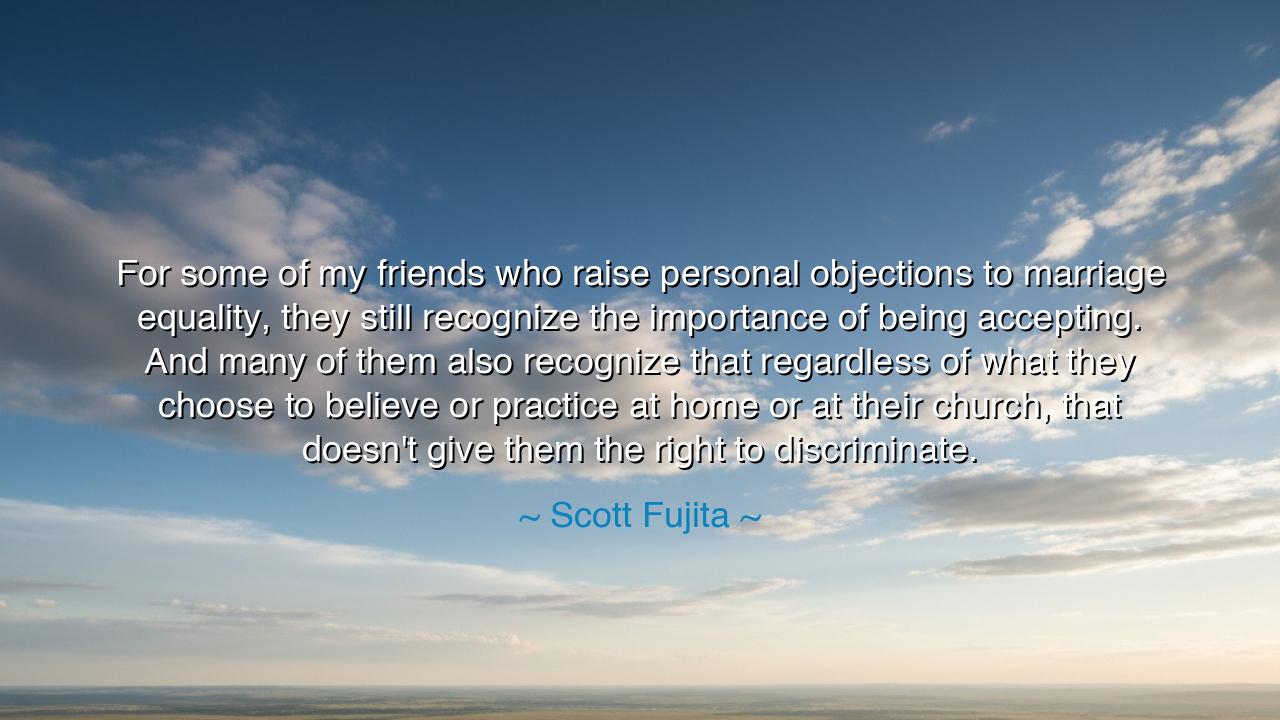
For some of my friends who raise personal objections to marriage
For some of my friends who raise personal objections to marriage equality, they still recognize the importance of being accepting. And many of them also recognize that regardless of what they choose to believe or practice at home or at their church, that doesn't give them the right to discriminate.






Hear the words of Scott Fujita, spoken with calm strength and the fire of justice: “For some of my friends who raise personal objections to marriage equality, they still recognize the importance of being accepting. And many of them also recognize that regardless of what they choose to believe or practice at home or at their church, that doesn't give them the right to discriminate.” In this saying, he speaks to the balance between personal conviction and public responsibility, between private faith and civic duty. His voice calls for wisdom: that though beliefs may differ, dignity must remain untouched.
The meaning of this declaration is both simple and profound. Fujita recognizes that marriage equality may not rest easily in every heart, for traditions, teachings, and personal convictions weigh heavily upon many. Yet he insists that belief does not give license to discrimination. One may hold to their personal truth, but when they walk in the public square, they must honor the shared truth of equality. It is the recognition that freedom of conscience ends where another’s humanity begins.
The origin of such wisdom lies deep in the struggles of democracy. A free society must protect both belief and equality, and the two often stand in tension. The danger comes when private conviction hardens into public oppression, when one group claims that their faith or culture justifies denying the rights of others. Fujita’s words cut through that danger: he teaches that acceptance is not agreement, but respect. A man may disagree, but he may not demean. A woman may object, but she may not oppress.
History itself offers us examples. In the days of the Civil Rights Movement, many argued from pulpits and traditions against racial integration. They claimed faith or custom as their shield. Yet men like Martin Luther King Jr. reminded the world that no scripture, no culture, no personal belief could justify denying a child access to education, or a family access to freedom. Slowly, society learned that private objections could not be permitted to become public chains. Fujita’s words stand in this same tradition, applied now to the struggle for marriage equality.
His statement is also a call to compassion. He acknowledges his friends who wrestle with belief, and he does not scorn them. Instead, he praises them when they choose acceptance over rejection, and respect over discrimination. This is a higher way: to recognize that love of neighbor is greater than the quarrels of ideology. In doing so, he models a path of reconciliation, where even those who disagree can live together in dignity and peace.
The lesson here is bright as a flame: belief is free, but discrimination is not. Let every person hold to their conscience in private, but let them remember that in the public life of the nation, every citizen stands equal. To deny this is to corrupt liberty itself, for freedom without equality becomes tyranny by another name. True freedom demands both conviction and compassion, both belief and respect.
So, children of tomorrow, carry these words into your days. Hold fast to your faith, your values, your traditions—but never let them become weapons against others. Learn the art of acceptance, which does not require agreement but demands respect. When tempted to exclude, remember that dignity belongs to all. And when you see others discriminated against in the name of belief, speak boldly, as Fujita did, that no private conviction grants the right to public injustice. In this way, you will honor both freedom and equality, and build a society where love is greater than fear.






AAdministratorAdministrator
Welcome, honored guests. Please leave a comment, we will respond soon